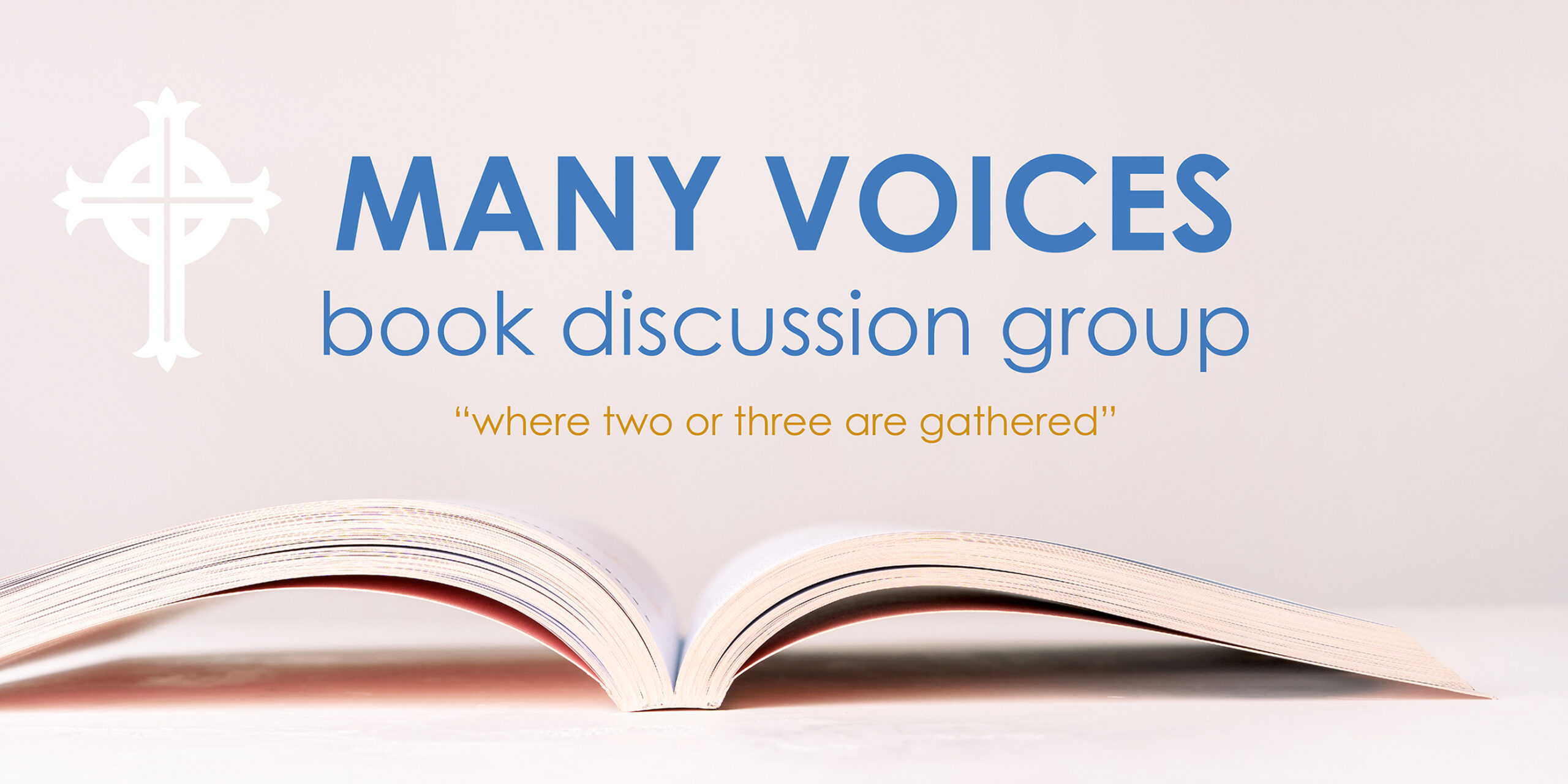
“Do the best you can until you know better. Then when you know better, do better.”
—Maya Angelou
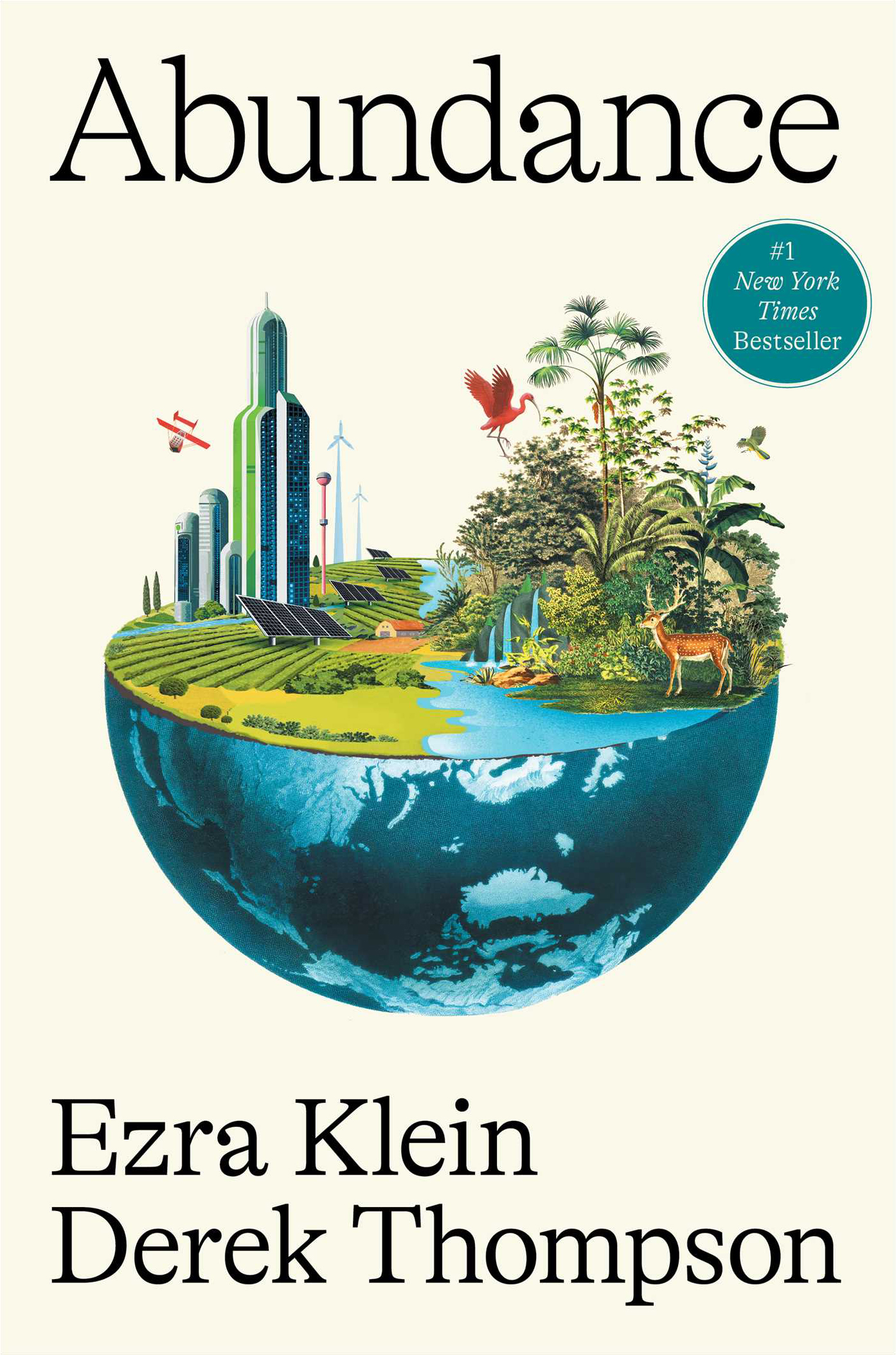
Oct + Nov, 2025
Abundance by Ezra Klein and Derek Thompson
“A must-read for progressives who want a blueprint for reforming government so it can deliver for working people.” —Barack Obama • “Spectacular…Offers a comprehensive indictment of the current problems and a clear path forward…Klein and Thompson usher in a mood shift. They inspire hope and enlarge the imagination.” —David Brooks, The New York Times
To trace the history of the twenty-first century so far is to trace a history of unaffordability and shortage. After years of refusing to build sufficient housing, America has a national housing crisis. After years of limiting immigration, we don’t have enough workers. Despite decades of being warned about the consequences of climate change, we haven’t built anything close to the clean-energy infrastructure we need. Ambitious public projects are finished late and over budget—if they are ever finished at all. The crisis that’s clicking into focus now has been building for decades—because we haven’t been building enough.
Abundance explains that our problems today are not the results of yesteryear’s villains. Rather, one generation’s solutions have become the next generation’s problems. Rules and regulations designed to solve the problems of the 1970s often prevent urban-density and green-energy projects that would help solve the problems of the 2020s. Laws meant to ensure that government considers the consequences of its actions have made it too difficult for government to act consequentially. In the last few decades, our capacity to see problems has sharpened while our ability to solve them has diminished.
Progress requires facing up to the institutions in life that are not working as they need to. It means, for liberals, recognizing when the government is failing. It means, for conservatives, recognizing when the government is needed. In a book exploring how we can move from a liberalism that not only protects and preserves but also builds, Klein and Thompson trace the political, economic, and cultural barriers to progress and propose a path toward a politics of abundance. At a time when movements of scarcity are gaining power in country after country, this is an answer that meets the challenges of the moment while grappling honestly with the fury so many rightfully feel.
We will be meeting on Thursdays, October 9th and November 13th, at 8PM via Zoom.
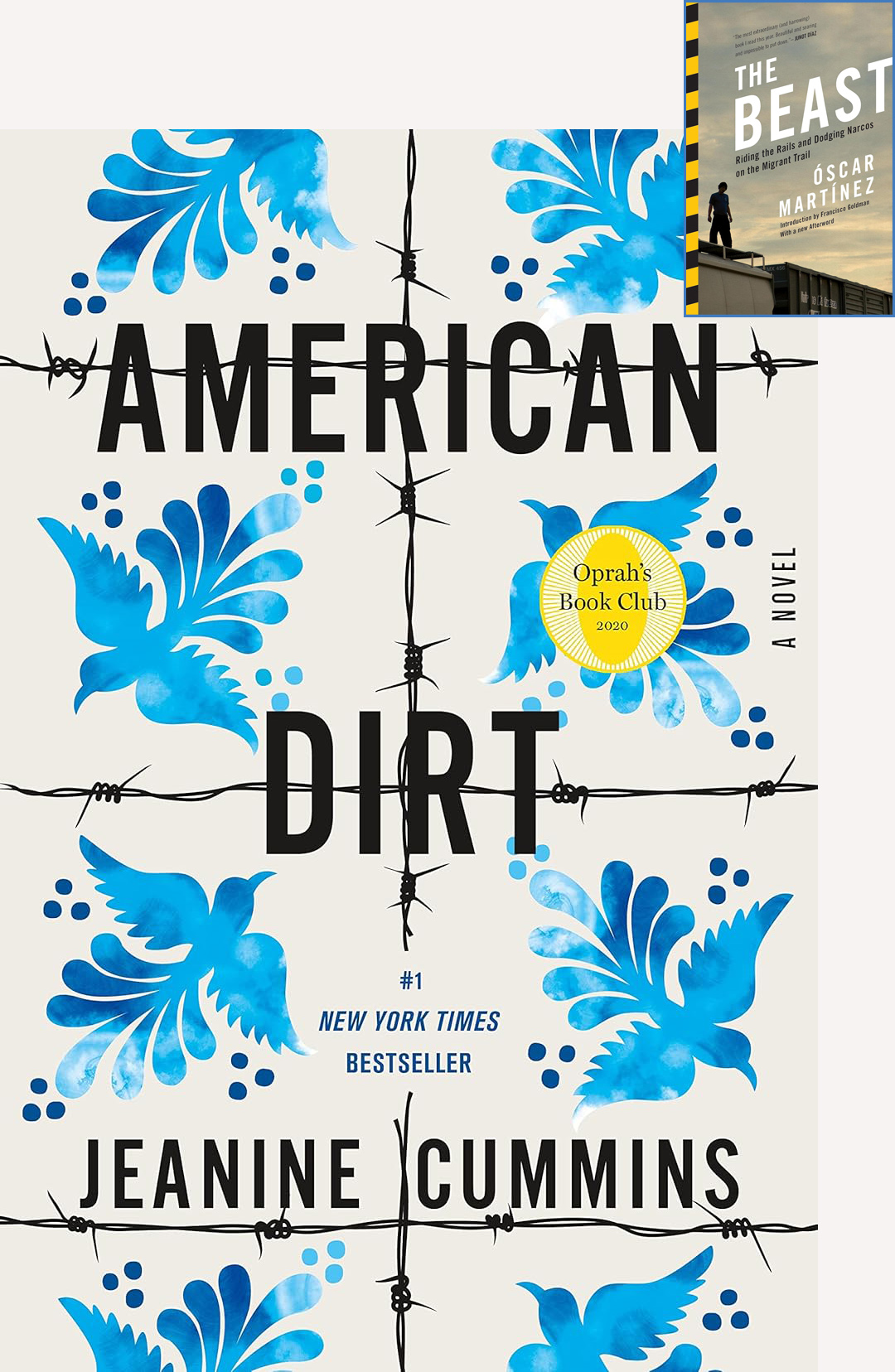
Nov + Apr, 2025
American Dirt by Jeanine Cummins
#1 New York Times bestseller and Oprah Book Club pick
Lydia lives in Acapulco. She has a son, Luca, the love of her life, and a wonderful husband who is a journalist. And while cracks are beginning to show in Acapulco because of the cartels, Lydia’s life is, by and large, fairly comfortable. But after her husband’s tell-all profile of the newest drug lord is published, none of their lives will ever be the same.
Forced to flee, Lydia and Luca find themselves joining the countless people trying to reach the United States. Lydia soon sees that everyone is running from something. But what exactly are they running to?
We will be reading this controversial fiction book for two months and follow it up with two months reading The Beast: Riding the Rails and Dodging Narcos on the Migrant Trail by Oscar Martinez. Then we will compare and contrast the NYT best seller fiction book by self-identified white American author Jeanine Cummins with the nonfiction book by Salvadoran investigative journalist Oscar Martinez and discuss why American Dirt is so controversial.
We will be meeting on Thursdays, November 14th and December 12th, at 8PM via Zoom.
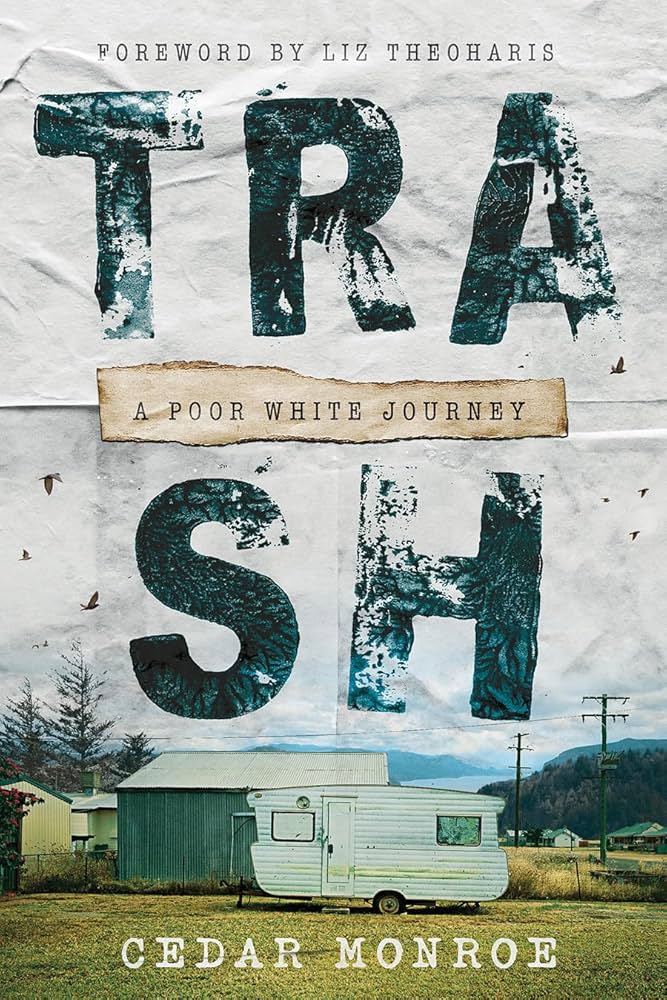
Sept + Oct, 2024
Trash: A Poor White Journey by Cedar Monroe
Human beings are not trash, and the system that enables humans to imagine each other as such needs to end. Every day across the US, 66 million poor white people pay the price for failing whiteness. In this sweeping debut, activist and chaplain Cedar Monroe writes indelibly about and for poor white about unlearning the American dream, untangling from white supremacy, and working for liberation alongside other poor folks. Monroe introduces us to people who are poor and unhoused in a small town in Washington, who eke out a living on land that once provided timber for the nation. On the banks of the Chehalis River, we meet residents of the largest homeless encampment in the country, who face sweeps and evictions and are targeted by vigilantes before bringing their case to federal court. We watch a community grapple with desperation, government neglect, and its own racism. From visits to jails, flophouses, tent cities, and on trips to hospitals and funeral homes, we see leaders forging connections between their people and the global movement to end poverty. With trenchant insight born of liberation theology, radical politics, and an even more radical hope, Monroe introduces us to people hammering out survival strategies and hope in the abandoned zones of empire. Capitalism and colonialism have stolen land from Indigenous people, forced workers into dangerous jobs, and then left them to die when their labor was no longer needed. But what would happen if poor white folks rejected the empty promises of white supremacy and embraced solidarity with other poor people? What if they joined the resistance to the system that is, slowly or quickly, killing us all? Trash asks us to see anew the peril in which poor white people live and the choices we all must make.
We will be meeting on Thursdays, September 12th and October 10th, at 8PM via Zoom.
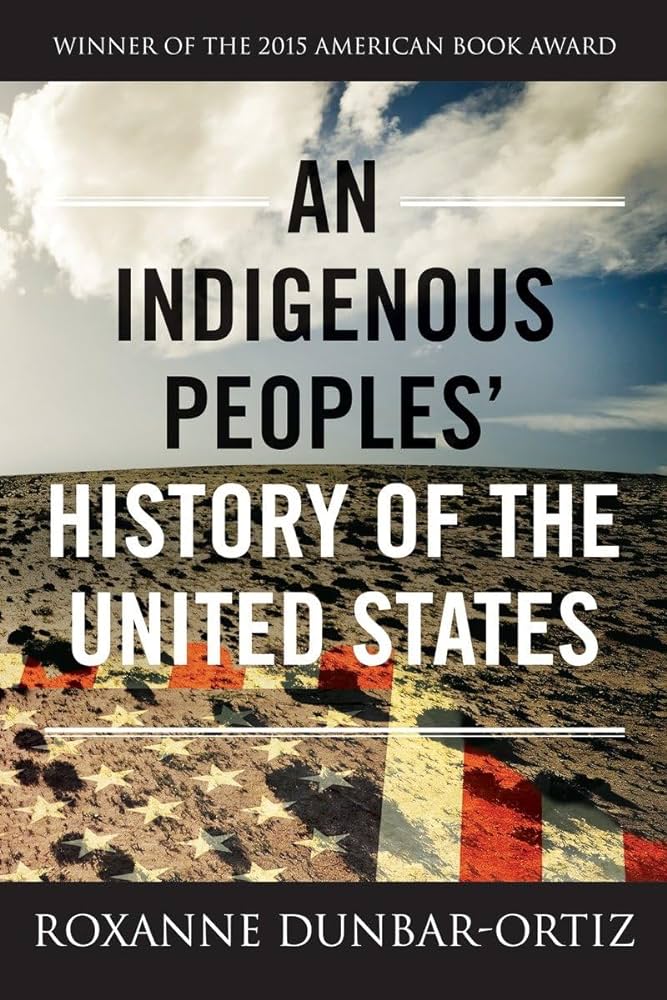
June, July + Aug, 2024
An Indigenous Peoples’ History of the United States by Roxanne Dunbar-Ortiz
NEW YORK TIMES BESTSELLER
Today in the United States, there are more than five hundred federally recognized Indigenous nations comprising nearly three million people, descendants of the fifteen million Native people who once inhabited this land. The centuries-long genocidal program of the U.S. settler-colonial regimen has largely been omitted from history. Acclaimed historian and activist Roxanne Dunbar-Ortiz offers a history of the United States told from the perspective of Indigenous peoples and reveals how Native Americans, for centuries, actively resisted expansion of the U.S. empire.
In An Indigenous Peoples’ History of the United States, Dunbar-Ortiz adroitly challenges the founding myth of the United States and shows how policy against the Indigenous peoples was colonialist and designed to seize the territories of the original inhabitants, displacing or eliminating them. And as Dunbar-Ortiz reveals, this policy was praised in popular culture, through writers like James Fenimore Cooper and Walt Whitman, and in the highest offices of government and the military. Shockingly, as the genocidal policy reached its zenith under President Andrew Jackson, its ruthlessness was best articulated by U.S. Army general Thomas S. Jesup, who, in 1836, wrote of the Seminoles: “The country can be rid of them only by exterminating them.”
We will be meeting on Thursdays, June 13th and July 11th, at 7PM via Zoom.
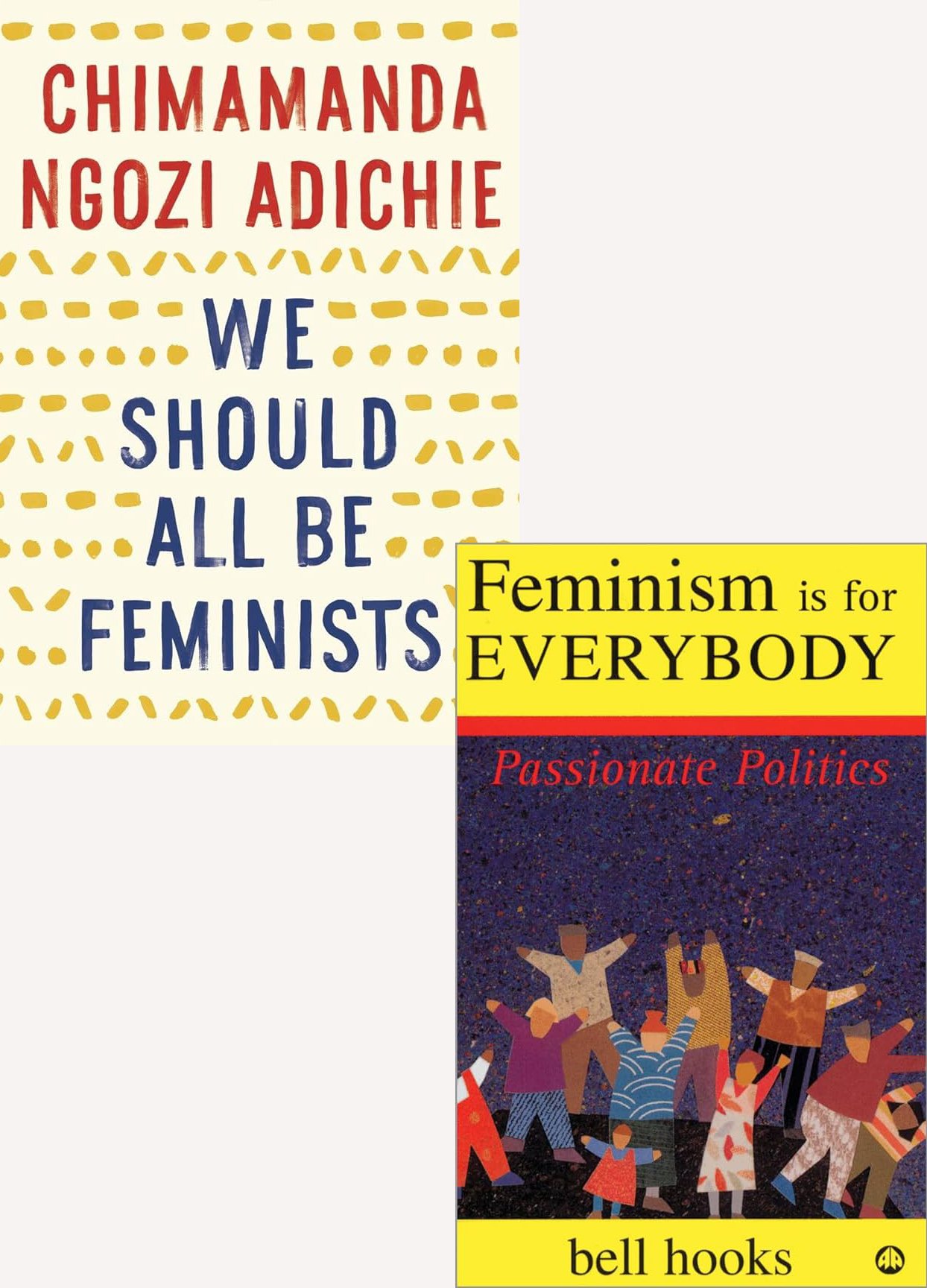
Apr + May, 2024
We Should All Be Feminists by Chimamanda Ngozi Adichie
NEW YORK TIMES BESTSELLER
In this personal, eloquently-argued essay—adapted from the much-admired TEDx talk of the same name—Chimamanda Ngozi Adichie offers readers a unique definition of feminism for the twenty-first century. Drawing extensively on her own experiences and her deep understanding of the often masked realities of sexual politics, here is one remarkable author’s exploration of what it means to be a woman now—and an of-the-moment rallying cry for why we should all be feminists.
Feminism Is For Everybody: Passionate Politics by bell hooks
A short, accessible introduction to feminist theory by one of its most influential practitioners. Designed to be read by all genders, this book provides both a primer to the question ‘what is feminism?’ and an argument for the enduring importance of the feminist movement today.
Beginning with a broad survey of feminism’s most important themes and concerns, bell hooks demystifies contentious concepts and turns apparent ideology into common sense. Providing a critical evaluation of the successes and failures of contemporary feminism, she looks at a wide variety of topics including reproductive rights, sexual violence, race, class and work. hooks encourages us to demand alternatives to patriarchal, racist and homophobic culture and thereby to seek out a different future.
We will be meeting on Thursday, April 11th to discuss We Should All Be Feminists and Thursday, May 9th at 7PM to discuss Feminism Is For Everybody.
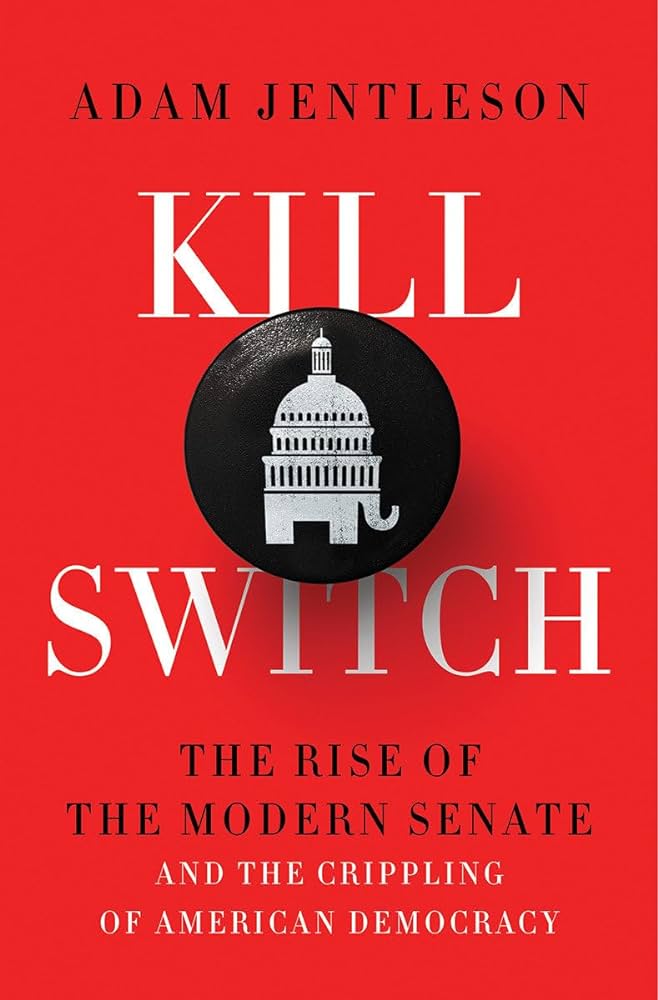
Feb + March, 2024
Kill Switch: The Rise of the Modern Senate and the Crippling of American Democracy by Adam Jentleson
“A truly excellent book… blistering and persuasive.” —Ezra Klein, New York Times
An insider’s account of how politicians representing a radical white minority of Americans have used “the world’s greatest deliberative body” to hijack our democracy.
Our democracy is under assault from homegrown authoritarians, with most observers blaming Donald Trump and the Republican Party that submitted to him. Yet as Adam Jentleson shows, the problem not only goes back to the nineteenth century, but is less about the presidency than it is about our nation’s most venerated institution: the United States Senate. A revelatory history of minority rule in America as expressed through the Senate filibuster, Kill Switch shows that white conservatives have long relied on the filibuster—which is not featured in the Constitution, and which, as Jentleson demonstrates, the Framers would have opposed—to shut down attempts to create a multiracial democracy.
We will be meeting on Thursday, February 8th and Thursday, March 14th at 7PM via Zoom.
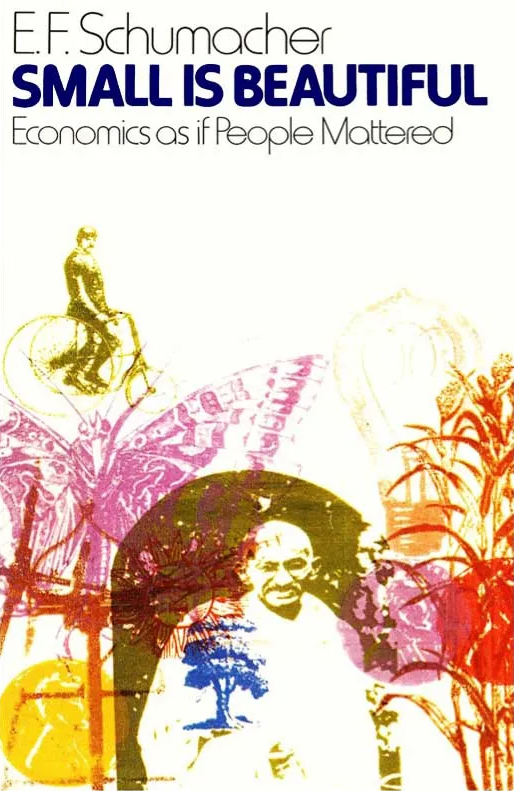
Oct, Nov, Dec, 2023 + Jan 2024
Small is Beautiful: Economics as if People Mattered by E.F. Schumacher
This New York Times bestselling “Eco Bible” (Time magazine) teaches us that economic growth must be responsibly balanced with the needs of communities and the environment.
“Embracing what Schumacher stood for–above all the idea of sensible scale–is the task for our time. Small is Beautiful could not be more relevant. It was first published in 1973, but it was written for our time.” — Bill McKibben, from the Foreword
Small Is Beautiful is Oxford-trained economist E. F. Schumacher’s classic call for the end of excessive consumption. Schumacher inspired such movements as “Buy Locally” and “Fair Trade,” while voicing strong opposition to “casino capitalism” and wasteful corporate behemoths. Named one of the Times Literary Supplement’s 100 Most Influential Books Since World War II, Small Is Beautiful presents eminently logical arguments for building our economies around the needs of communities, not corporations.
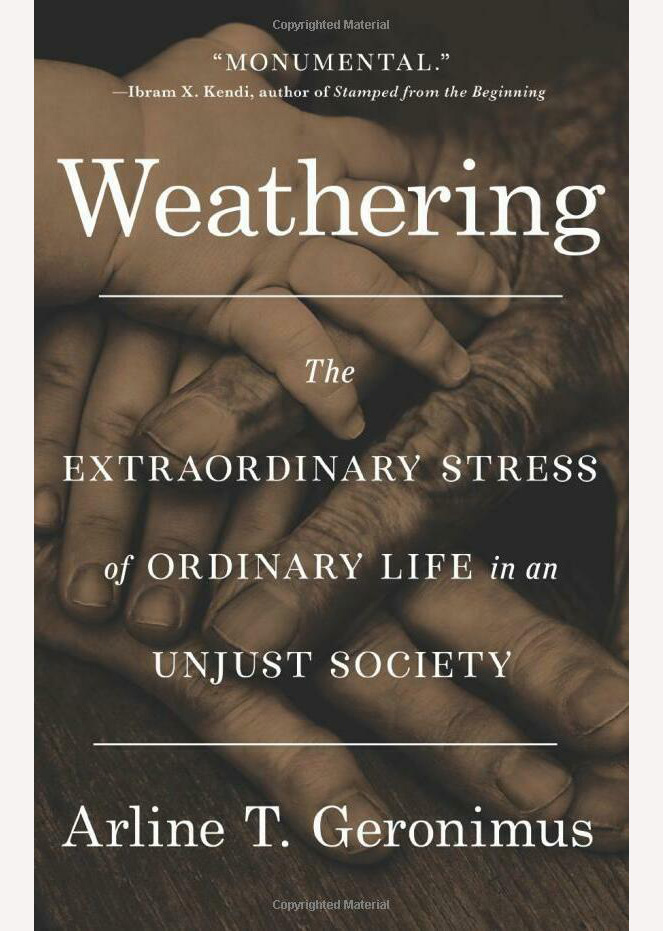
Aug + Sept, 2023
Weathering: The Extraordinary Stress of Ordinary Life in an Unjust Society by Arline T. Geroniumus
Fusing science and social justice, renowned public health researcher Dr. Arline T. Geronimus offers an urgent, “monumental” book exploring the ways in which systemic injustice erodes the health of marginalized people.
America has woken up to what many of its citizens have known for centuries and to what public health statistics have evidenced for decades: systemic injustice takes a physical, too often deadly, toll on Black, brown, working class and poor communities, and any group who experiences systemic cultural oppression or economic exploitation. Marginalized Americans are disproportionately more likely to suffer from chronic diseases and to die at much younger ages than their middle- and upper-class white counterparts. Black mothers die during childbirth at a rate three times higher than white mothers. White kids in high-poverty Appalachian regions have a healthy life expectancy of 50 years old, while the vast majority of US youth can expect to both survive and be able-bodied at 50, with decades of healthy life expectancy ahead of them. In the face of such clear inequity, we must ask ourselves why this is, and what we can we do.
Dr. Arline T. Geronimus coined the term “weathering” to describe the effects of systemic oppression—including racism and classism—on the body. In Weathering , based on more than 30 years of research, she argues that health and aging have more to do with how society treats us than how well we take care of ourselves. She explains what happens to human bodies as they attempt to withstand and overcome the challenges and insults that society leverages at them, and details how this process ravages their health. And she proposes solutions.
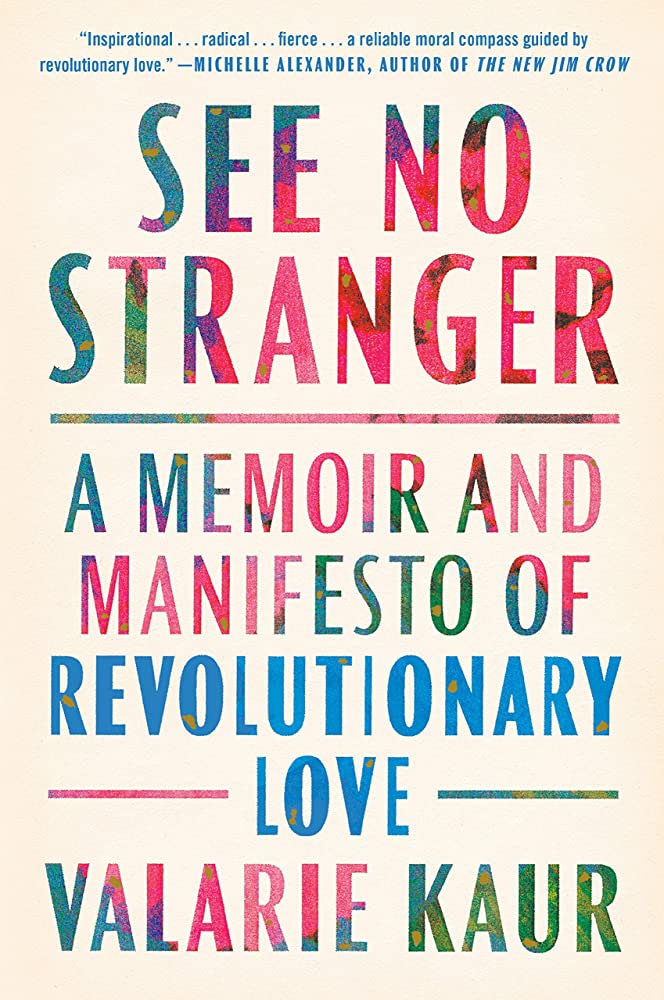
June + July, 2023
See No Stranger: A Memoir and Manifesto of Revolutionary Love by Valarie Kaur
2021 Dayton Literary Peace Prize Finalist
Valarie Kaur — renowned Sikh activist, filmmaker, and civil rights lawyer — has ignited the hearts of millions around the globe, making “Breathe and Push!” a mantra in movements for social change. Now in her stunning debut, Kaur declares revolutionary love is the call of our times, a radical, joyful practice that extends in three directions: to others, to our opponents, and to ourselves. It enjoins us to see no stranger but instead look at others and say: You are a part of me I do not yet know.
Drawing from the wisdom of sages, scientists, and activists—and her own riveting journey as a brown girl growing up in California farmland; as a young adult galvanized by the murders of Sikhs after 9/11; as a law student fighting injustices in American prisons and on Guantánamo Bay; as an activist working with communities recovering from xenophobic attacks; and as a woman trying to heal from her own experiences with sexual assault and police violence – Kaur discovers practices of revolutionary love to bring us longevity, resilience, and joy.
See No Stranger is a practical guide to changing the world, a synthesis of wisdom, a chronicle of personal and communal history—all joined together by a story of awakening. Revolutionary love is medicine for our times. It just might be our best chance for our collective future.
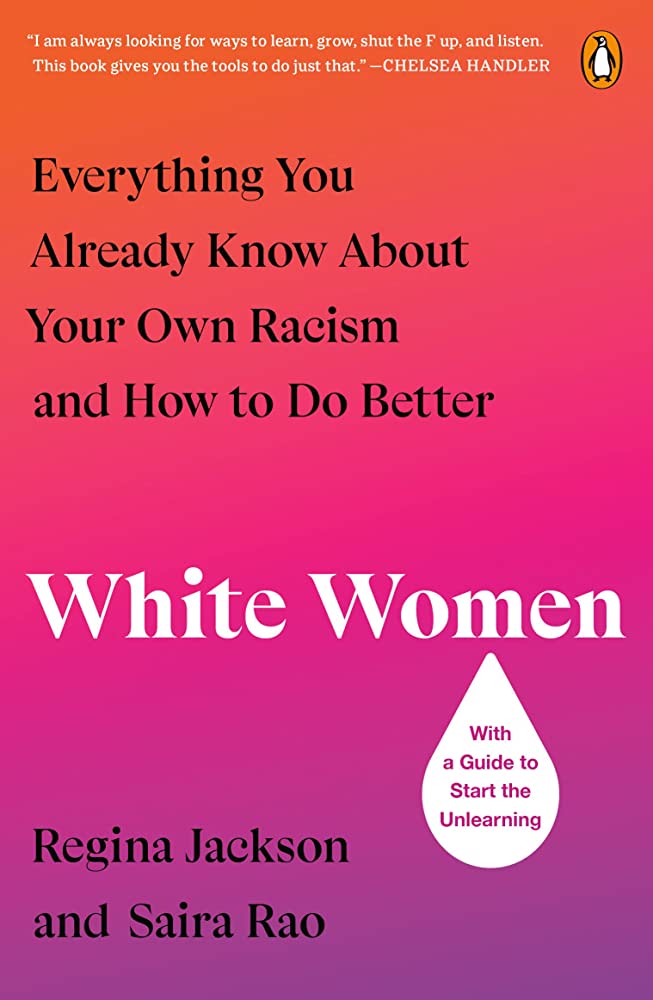
April + May, 2023
White Women: Everything You Already Know About Your Own Racism and How to Do Better by Regina Jackson and Saira Rao
A New York Times bestseller
It’s no secret that white women are conditioned to be “nice,” but did you know that the desire to be perfect and to avoid conflict at all costs are characteristics of white supremacy culture?
As the founders of Race2Dinner, an organization which facilitates conversations between white women about racism and white supremacy, Regina Jackson and Saira Rao have noticed white women’s tendency to maintain a veneer of niceness, and strive for perfection, even at the expense of anti-racism work.
In this book, Jackson and Rao pose these urgent questions: how has being “nice” helped Black women, Indigenous women and other women of color? How has being “nice” helped you in your quest to end sexism? Has being “nice” earned you economic parity with white men? Beginning with freeing white women from this oppressive need to be nice, they deconstruct and analyze nine aspects of traditional white woman behavior–from tone-policing to weaponizing tears–that uphold white supremacy society, and hurt all of us who are trying to live a freer, more equitable life.
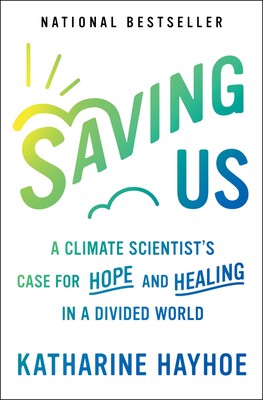
Our First Read
Saving Us by Katharine Hayhoe
Called “one of the nation’s most effective communicators on climate change” by The New York Times, Katharine Hayhoe knows how to navigate all sides of the conversation on our changing planet. A Canadian climate scientist living in Texas, she negotiates distrust of data, indifference to imminent threats, and resistance to proposed solutions with ease. Over the past fifteen years Hayhoe has found that the most important thing we can do to address climate change is talk about it—and she wants to teach you how.
In Saving Us, Hayhoe argues that when it comes to changing hearts and minds, facts are only one part of the equation. We need to find shared values in order to connect our unique identities to collective action. This is not another doomsday narrative about a planet on fire. It is a multilayered look at science, faith, and human psychology, from an icon in her field—recently named chief scientist at The Nature Conservancy.
